译林版(2020)必修第三册: Unit 2 Natural Disasters Grammar不定式作定语和结果状语课件(27张)
文档属性
| 名称 | 译林版(2020)必修第三册: Unit 2 Natural Disasters Grammar不定式作定语和结果状语课件(27张) |

|
|
| 格式 | pptx | ||
| 文件大小 | 2.5MB | ||
| 资源类型 | 教案 | ||
| 版本资源 | 牛津译林版(2019) | ||
| 科目 | 英语 | ||
| 更新时间 | 2022-03-17 20:06:36 | ||
图片预览

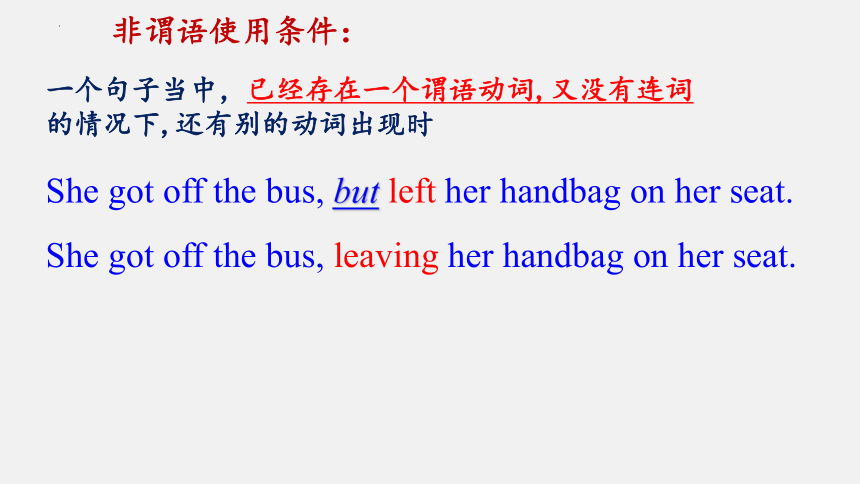
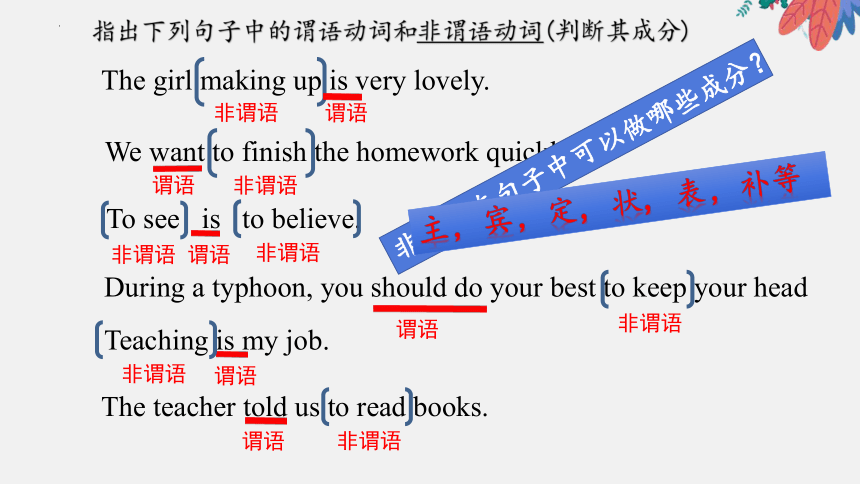
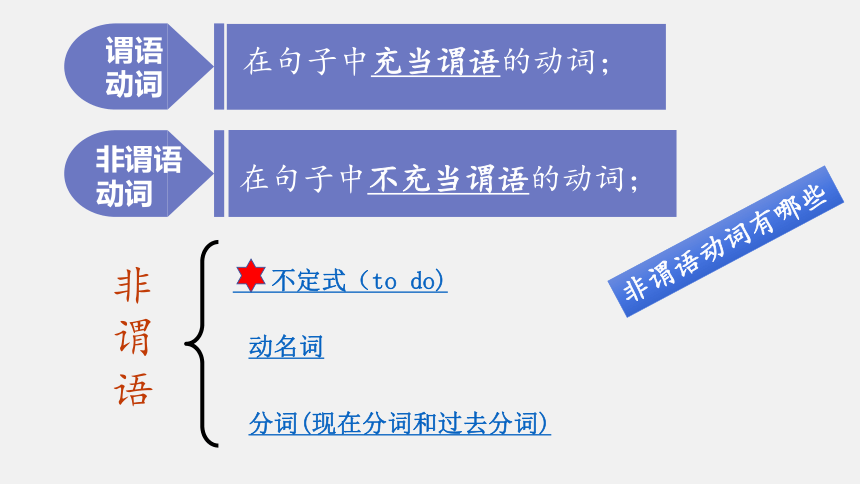
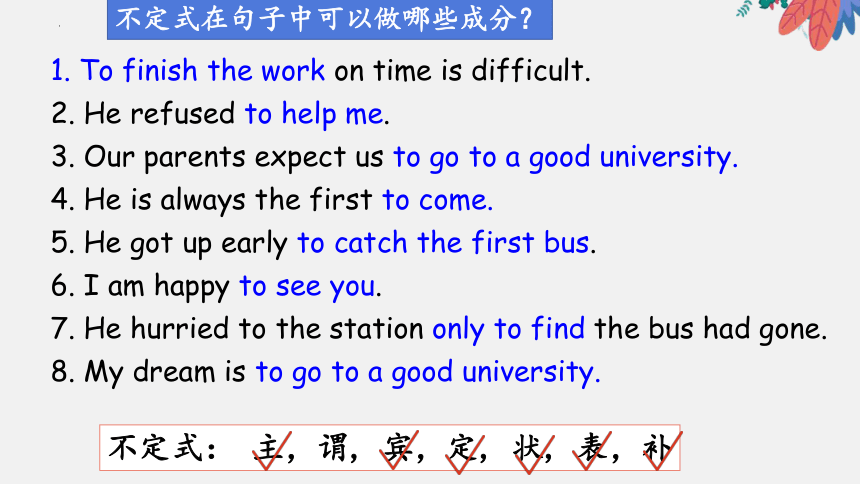

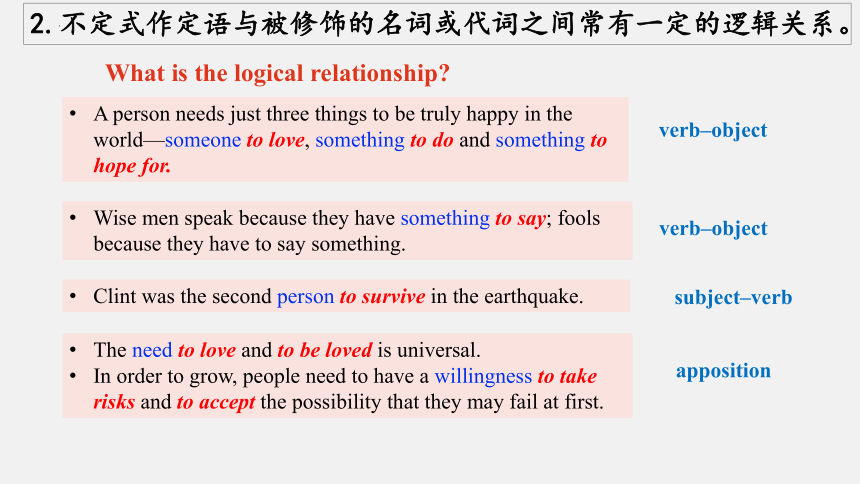

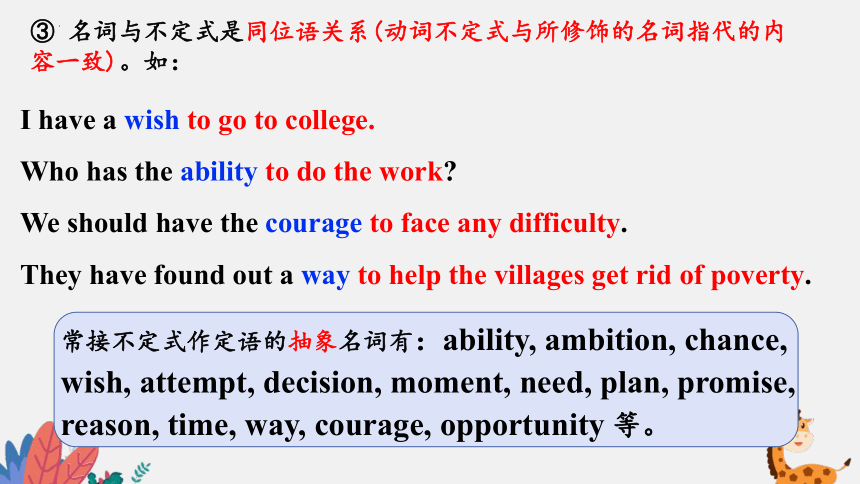
文档简介
(共27张PPT)
不定式作定语和结果状语
非谓语使用条件:
一个句子当中,已经存在一个谓语动词,又没有连词的情况下,还有别的动词出现时
She got off the bus, but left her handbag on her seat.
She got off the bus, leaving her handbag on her seat.
The teacher told us to read books.
Teaching is my job.
We want to finish the homework quickly.
指出下列句子中的谓语动词和非谓语动词(判断其成分)
The girl making up is very lovely.
谓语
非谓语
To see is to believe.
非谓语
谓语
非谓语
谓语
谓语
谓语
非谓语
非谓语
During a typhoon, you should do your best to keep your head
非谓语
非谓语
谓语
非谓语在句子中可以做哪些成分?
主,宾,定, 状, 表,补等
谓语
动词
非谓语
动词
在句子中充当谓语的动词;
在句子中不充当谓语的动词;
非谓语
不定式(to do)
动名词
分词(现在分词和过去分词)
非谓语动词有哪些
1. To finish the work on time is difficult.
2. He refused to help me.
3. Our parents expect us to go to a good university.
4. He is always the first to come.
5. He got up early to catch the first bus.
6. I am happy to see you.
7. He hurried to the station only to find the bus had gone.
8. My dream is to go to a good university.
不定式在句子中可以做哪些成分?
不定式: 主,谓, 宾,定, 状, 表,补
动词不定式作定语
1.动词不定式作定语,一般置于被修饰的名词或代词后面
Is this the best way to help him
这是帮他的最佳方法吗?
Your wish to be a teacher is quite understandable.
你想成为一个教师的愿望是可以理解的。
Clint was the second person to survive in the earthquake.
subject–verb
A person needs just three things to be truly happy in the world—someone to love, something to do and something to hope for.
Wise men speak because they have something to say; fools because they have to say something.
verb–object
The need to love and to be loved is universal.
In order to grow, people need to have a willingness to take risks and to accept the possibility that they may fail at first.
apposition
What is the logical relationship
verb–object
2.不定式作定语与被修饰的名词或代词之间常有一定的逻辑关系。
① 名词或代词为动词不定式的逻辑主语(主谓关系)。如:
Wendy was the first student to arrive at school.
②名词或代词为不定式的逻辑宾语(动宾关系)。如:
I have a meeting to attend.
Tip:如果不定式是不及物动词,需要加介词才能与名词之间构成动宾关系。如:
This is a good topic to talk about.
③ 名词与不定式是同位语关系(动词不定式与所修饰的名词指代的内容一致)。如:
I have a wish to go to college.
Who has the ability to do the work
We should have the courage to face any difficulty.
They have found out a way to help the villages get rid of poverty.
常接不定式作定语的抽象名词有:ability, ambition, chance, wish, attempt, decision, moment, need, plan, promise, reason, time, way, courage, opportunity 等。
3. 动词不定式作定语,有被动形式。如:
The house to be built there will be a library.
He was the first person to be awarded such a prize.
She made a list of the people to be invited.
4. 当中心词是序数词或被序数词、形容词最高级及the next, the only, the last等限定时,常用不定式作后置定语。
She was the first woman to win the gold medal in the Olympic Games.
She is the only person to be admitted to the committee.
① Have you anything to send
② Have you anything to be sent
当作定语的不定式所修饰的名词或代词是不定式动作的承受者时,不定式既可以用主动语态,也可用被动语态,但其含义有所不同。
你有什么东西要寄吗
你有什么要(我或别人)寄的东西吗
(不定式 to send的动作执行者是 you)
(不定式 to be sent的动作执行者是已被省略的 me 或 someone else)
1.通常放在其修饰的名词或代词_____;
2.与被修饰的名词或代词之间有一定的逻辑关系:________、__________或___________。
3.动词不定式作定语,有被动形式。
4.当中心词是_______或_______________________及the next, the only, the last等限定时,常用不定式作后置定语。
后面
主谓关系
动宾关系
同位关系
动词不定式作定语
序数词
被序数词、形容词最高级
1. Do you know who is the first Chinese ________ (walk) on the moon
2. Do you have anything ________(say) If not, we will put an end to the meeting.
3. He has no friend _______________(depend).
4. Are you going to the meeting ____________(hold) next week
5. The new building ________________ ( complete) next year will be a city museum.
6. There may be an opportunity for you _______ (see) the famous star.
to walk
to say
to depend on
to be held
to be completed
to see
Practice
动词不定式作结果状语
动词不定式作结果状语,常见于以下结构:
1. 在 too…to… (太……而不能)结构中,表示反面结果,如:
It’s never too late to learn.
The case was too heavy to be carried by a child.
2. 在 …enough to… (如此……以至于……)结构中。如:
I was fortunate enough to get the ticket.
The hall is large enough to hold 3,000 people.
3. 在 never to… (不再......)结构中,可以接后续的结果。如:
He left home, never to return.
She left, never to be seen again.
4. 在 only to… 结构中,不定式常表示没有预料到的结果。如:
I hurried to the station, only to find the train gone.
I rushed to the destination, only to find him not there.
He returned after the war, only to be told that his wife had left him.
5. 在 so… as to… 结构中。如:
Jane sang so well as to come out first in the singing competition.
She was so angry as to be unable to speak.
We are not such fools as to believe him.
She won’t be such a careless person as to forget to lock the door.
6. 在 such + 名词 +as to… 结构中。如:
不定式作结果状语常用于以下句型结构:
① ________________(太......而不能)
② ________________(如此......以至于)
③ ________________(常表示意外的或事与愿违的结果)
④ ________________(如此......以致于)
⑤ ________________(可以接后续的结果)
so/such… as to do
enough to do
only to do
too … to do
动词不定式作结果状语
never to ...
Practice
1. The goods are too heavy ________(carry).
2. I hurried to his house, only ________(find) that he was not at home.
3. I ran to the school, only _____________ (inform) that I wasn’t admitted by Peking University.
4. This man was strong enough _______(lift)the heavy stone.
5. Dinosaurs have died out on the earth, never __________(see) again.
6. He is such a fool ____________ able to answer the question.
to carry
to find
to be informed
to lift
to be seen
as not to be
动词不定式的基本结构 (时态+语态)
主动形式 被动形式
一般式
完成式
进行式
完成进行式
导学案
to do
to have done
to be doing
to have been doing
to be done
to have been done
无
无
1.不定式一般式:表示的动作与谓语动词表示的动作同时发生,或者发生在它的后面;
I heard her sing. (唱和听见同时发生)
I expect to come back next Sunday.(“回来”发生在“预计”之后)
2.不定式完成式:表示的动作发生在谓语动词表示的动作之前;
Zhang Sanfeng, a 13th-century Taoist,was said to have invented tai chi.
3.不定式进行式:表示的动作与谓语动词表示的动作同时发生;
She seems to be waiting for somebody.
When he came to see me, I happened to be taking a bath.
4.不定式完成进行式:表示的动作发生在谓语动词表示的动作之前,并延续到那个时候,可能仍在进行;
She is said to have been waiting a novel this year.
She seemed to have been working on a difficult maths problem.
5.主动语态:一般表示主动的意义,但有时也可以表示被动意义;
They began to learn Japanese last winter.
Some stars are too far to see.(= to be seen)
6. 被动语态:表示被动的意义;
The composition contest is to be held next month.
She is anxious to be invited to the ball.
1. I was watching the clock all through the meeting, as I had a train ______ (catch).
2. Volunteering gives you a chance ___________(change) lives.
3. The airport _______________(complete) next year will help promote tourism in this area.
4. Li Na , the first __________(achieve) a raning of world No.2 in Asia, retired from tennis in September.
5. What is the best way you can imagine __________ (reduce) the overuse of water in our school
6. Bob lifted a rock only ________(drop) it on his own feet.
7. She pretended _____________(read) when the teacher came in.
8. I hurried home, only ________(find) all the furniture had been washed away.
to catch
to change
to be completed
to achieve
to reduce
to be reading
to find
Consolidation
to drop
Anna is interviewing her teacher, Mr Li, about his experiences during a hurricane. Find the sentences with to-infinitives and fill in the table below. The first ones have been done for you.
1
2
To-infinitives as attributives(定语)
3
To-infinitives as adverbials of result (结果状语)
1
2
after
unexpected
P21 B1
作定语
作宾语
作宾语补足语
作结果状语
作目的状语
to find books about hurricanes
to find he was not in his office
to attend
to make PPT slides for my project
P21 B2
was actually the first to leave
to keep us warm
wanted to return home as soon as possible
to find it completely destroyed
advised us to take an active part in the rebuilding
P21 B3
不定式作定语和结果状语
非谓语使用条件:
一个句子当中,已经存在一个谓语动词,又没有连词的情况下,还有别的动词出现时
She got off the bus, but left her handbag on her seat.
She got off the bus, leaving her handbag on her seat.
The teacher told us to read books.
Teaching is my job.
We want to finish the homework quickly.
指出下列句子中的谓语动词和非谓语动词(判断其成分)
The girl making up is very lovely.
谓语
非谓语
To see is to believe.
非谓语
谓语
非谓语
谓语
谓语
谓语
非谓语
非谓语
During a typhoon, you should do your best to keep your head
非谓语
非谓语
谓语
非谓语在句子中可以做哪些成分?
主,宾,定, 状, 表,补等
谓语
动词
非谓语
动词
在句子中充当谓语的动词;
在句子中不充当谓语的动词;
非谓语
不定式(to do)
动名词
分词(现在分词和过去分词)
非谓语动词有哪些
1. To finish the work on time is difficult.
2. He refused to help me.
3. Our parents expect us to go to a good university.
4. He is always the first to come.
5. He got up early to catch the first bus.
6. I am happy to see you.
7. He hurried to the station only to find the bus had gone.
8. My dream is to go to a good university.
不定式在句子中可以做哪些成分?
不定式: 主,谓, 宾,定, 状, 表,补
动词不定式作定语
1.动词不定式作定语,一般置于被修饰的名词或代词后面
Is this the best way to help him
这是帮他的最佳方法吗?
Your wish to be a teacher is quite understandable.
你想成为一个教师的愿望是可以理解的。
Clint was the second person to survive in the earthquake.
subject–verb
A person needs just three things to be truly happy in the world—someone to love, something to do and something to hope for.
Wise men speak because they have something to say; fools because they have to say something.
verb–object
The need to love and to be loved is universal.
In order to grow, people need to have a willingness to take risks and to accept the possibility that they may fail at first.
apposition
What is the logical relationship
verb–object
2.不定式作定语与被修饰的名词或代词之间常有一定的逻辑关系。
① 名词或代词为动词不定式的逻辑主语(主谓关系)。如:
Wendy was the first student to arrive at school.
②名词或代词为不定式的逻辑宾语(动宾关系)。如:
I have a meeting to attend.
Tip:如果不定式是不及物动词,需要加介词才能与名词之间构成动宾关系。如:
This is a good topic to talk about.
③ 名词与不定式是同位语关系(动词不定式与所修饰的名词指代的内容一致)。如:
I have a wish to go to college.
Who has the ability to do the work
We should have the courage to face any difficulty.
They have found out a way to help the villages get rid of poverty.
常接不定式作定语的抽象名词有:ability, ambition, chance, wish, attempt, decision, moment, need, plan, promise, reason, time, way, courage, opportunity 等。
3. 动词不定式作定语,有被动形式。如:
The house to be built there will be a library.
He was the first person to be awarded such a prize.
She made a list of the people to be invited.
4. 当中心词是序数词或被序数词、形容词最高级及the next, the only, the last等限定时,常用不定式作后置定语。
She was the first woman to win the gold medal in the Olympic Games.
She is the only person to be admitted to the committee.
① Have you anything to send
② Have you anything to be sent
当作定语的不定式所修饰的名词或代词是不定式动作的承受者时,不定式既可以用主动语态,也可用被动语态,但其含义有所不同。
你有什么东西要寄吗
你有什么要(我或别人)寄的东西吗
(不定式 to send的动作执行者是 you)
(不定式 to be sent的动作执行者是已被省略的 me 或 someone else)
1.通常放在其修饰的名词或代词_____;
2.与被修饰的名词或代词之间有一定的逻辑关系:________、__________或___________。
3.动词不定式作定语,有被动形式。
4.当中心词是_______或_______________________及the next, the only, the last等限定时,常用不定式作后置定语。
后面
主谓关系
动宾关系
同位关系
动词不定式作定语
序数词
被序数词、形容词最高级
1. Do you know who is the first Chinese ________ (walk) on the moon
2. Do you have anything ________(say) If not, we will put an end to the meeting.
3. He has no friend _______________(depend).
4. Are you going to the meeting ____________(hold) next week
5. The new building ________________ ( complete) next year will be a city museum.
6. There may be an opportunity for you _______ (see) the famous star.
to walk
to say
to depend on
to be held
to be completed
to see
Practice
动词不定式作结果状语
动词不定式作结果状语,常见于以下结构:
1. 在 too…to… (太……而不能)结构中,表示反面结果,如:
It’s never too late to learn.
The case was too heavy to be carried by a child.
2. 在 …enough to… (如此……以至于……)结构中。如:
I was fortunate enough to get the ticket.
The hall is large enough to hold 3,000 people.
3. 在 never to… (不再......)结构中,可以接后续的结果。如:
He left home, never to return.
She left, never to be seen again.
4. 在 only to… 结构中,不定式常表示没有预料到的结果。如:
I hurried to the station, only to find the train gone.
I rushed to the destination, only to find him not there.
He returned after the war, only to be told that his wife had left him.
5. 在 so… as to… 结构中。如:
Jane sang so well as to come out first in the singing competition.
She was so angry as to be unable to speak.
We are not such fools as to believe him.
She won’t be such a careless person as to forget to lock the door.
6. 在 such + 名词 +as to… 结构中。如:
不定式作结果状语常用于以下句型结构:
① ________________(太......而不能)
② ________________(如此......以至于)
③ ________________(常表示意外的或事与愿违的结果)
④ ________________(如此......以致于)
⑤ ________________(可以接后续的结果)
so/such… as to do
enough to do
only to do
too … to do
动词不定式作结果状语
never to ...
Practice
1. The goods are too heavy ________(carry).
2. I hurried to his house, only ________(find) that he was not at home.
3. I ran to the school, only _____________ (inform) that I wasn’t admitted by Peking University.
4. This man was strong enough _______(lift)the heavy stone.
5. Dinosaurs have died out on the earth, never __________(see) again.
6. He is such a fool ____________ able to answer the question.
to carry
to find
to be informed
to lift
to be seen
as not to be
动词不定式的基本结构 (时态+语态)
主动形式 被动形式
一般式
完成式
进行式
完成进行式
导学案
to do
to have done
to be doing
to have been doing
to be done
to have been done
无
无
1.不定式一般式:表示的动作与谓语动词表示的动作同时发生,或者发生在它的后面;
I heard her sing. (唱和听见同时发生)
I expect to come back next Sunday.(“回来”发生在“预计”之后)
2.不定式完成式:表示的动作发生在谓语动词表示的动作之前;
Zhang Sanfeng, a 13th-century Taoist,was said to have invented tai chi.
3.不定式进行式:表示的动作与谓语动词表示的动作同时发生;
She seems to be waiting for somebody.
When he came to see me, I happened to be taking a bath.
4.不定式完成进行式:表示的动作发生在谓语动词表示的动作之前,并延续到那个时候,可能仍在进行;
She is said to have been waiting a novel this year.
She seemed to have been working on a difficult maths problem.
5.主动语态:一般表示主动的意义,但有时也可以表示被动意义;
They began to learn Japanese last winter.
Some stars are too far to see.(= to be seen)
6. 被动语态:表示被动的意义;
The composition contest is to be held next month.
She is anxious to be invited to the ball.
1. I was watching the clock all through the meeting, as I had a train ______ (catch).
2. Volunteering gives you a chance ___________(change) lives.
3. The airport _______________(complete) next year will help promote tourism in this area.
4. Li Na , the first __________(achieve) a raning of world No.2 in Asia, retired from tennis in September.
5. What is the best way you can imagine __________ (reduce) the overuse of water in our school
6. Bob lifted a rock only ________(drop) it on his own feet.
7. She pretended _____________(read) when the teacher came in.
8. I hurried home, only ________(find) all the furniture had been washed away.
to catch
to change
to be completed
to achieve
to reduce
to be reading
to find
Consolidation
to drop
Anna is interviewing her teacher, Mr Li, about his experiences during a hurricane. Find the sentences with to-infinitives and fill in the table below. The first ones have been done for you.
1
2
To-infinitives as attributives(定语)
3
To-infinitives as adverbials of result (结果状语)
1
2
after
unexpected
P21 B1
作定语
作宾语
作宾语补足语
作结果状语
作目的状语
to find books about hurricanes
to find he was not in his office
to attend
to make PPT slides for my project
P21 B2
was actually the first to leave
to keep us warm
wanted to return home as soon as possible
to find it completely destroyed
advised us to take an active part in the rebuilding
P21 B3
同课章节目录
- Unit 1 Nature in the balance
- Welcome to the unit
- Reading
- Grammar and usage
- Integrated skills
- Extended reading
- Project
- Unit 2 Natural disasters
- Welcome to the unit
- Reading
- Grammar and usage
- Integrated skills
- Extended reading
- Project
- Unit 3 The world online
- Welcome to the unit
- Reading
- Grammar and usage
- Integrated skills
- Extended reading
- Project
- Unit 4 Scientists who changed the world
- Welcome to the unit
- Reading
- Grammar and usage
- Integrated skills
- Extended reading
- Project
